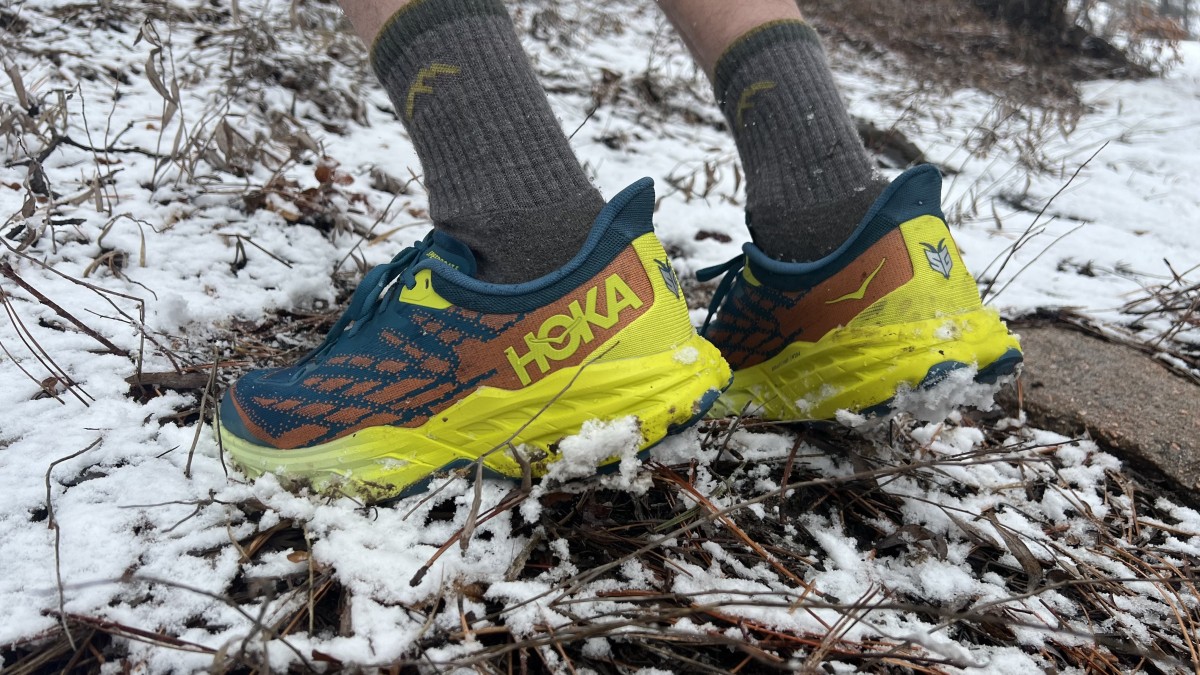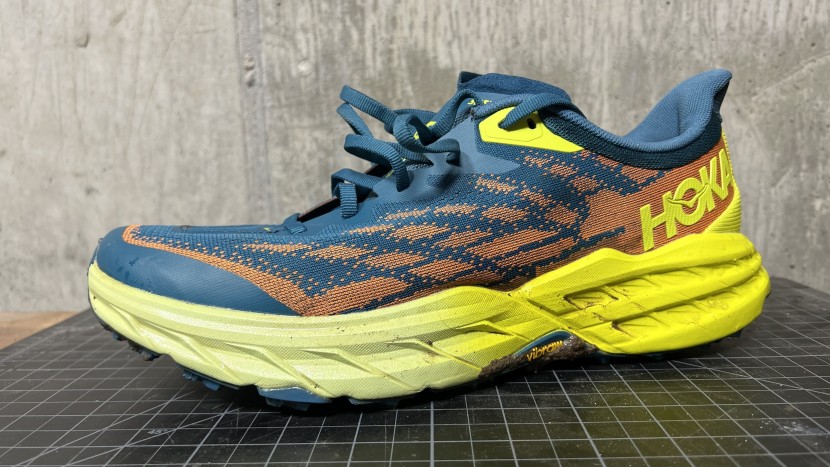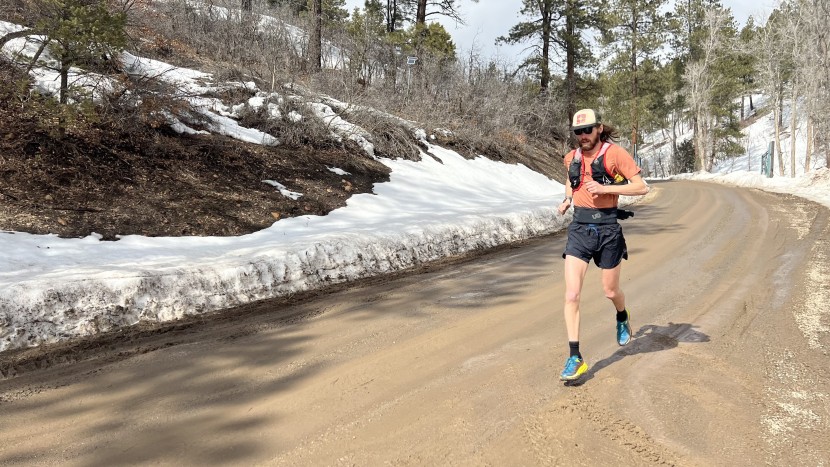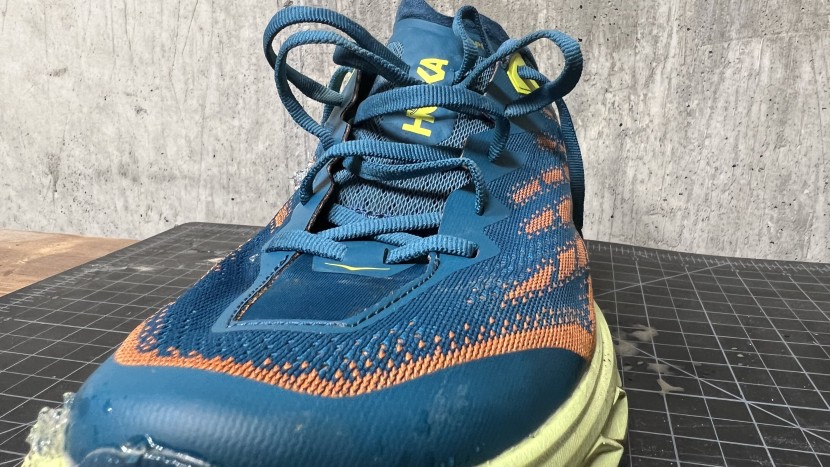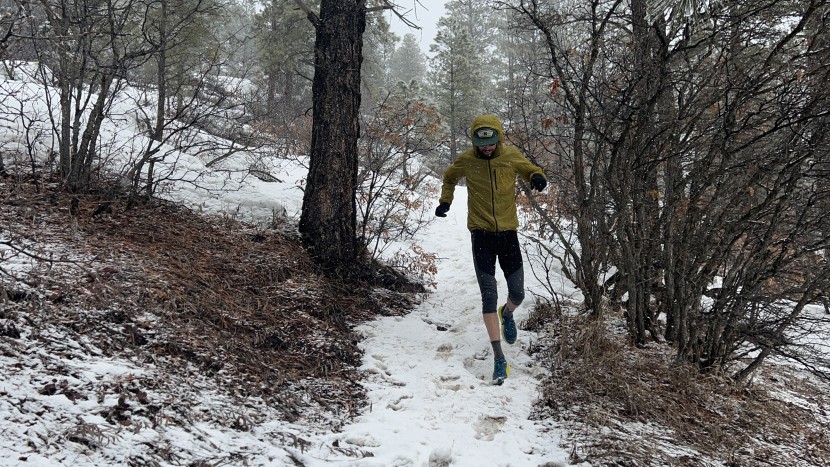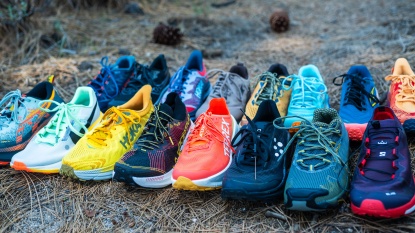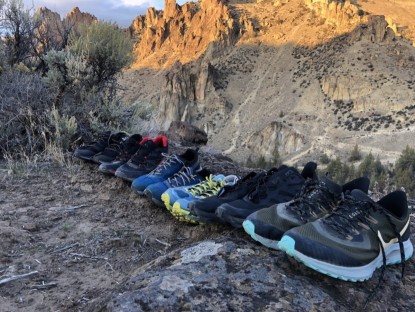
Our Verdict
Our Analysis and Test Results
With how much cushioning the Speedgoat 5 provides, we are impressed with how sharp the shoe feels. Yes, it's springy, and yes, it compresses, but it still feels lively. Aggressive running feels supported, and the turnover is natural. Descending fast is a dream; the measured 6mm drop (Hoka claims 4mm) is spot on and helps reduce fatigue, especially on technical terrain. This descending comfort is a large reason why we love this shoe so much. If you have an ultra on your schedule with a rollercoaster of an elevation graph, then this could be the perfect model for you.
Foot Protection
While the Speedgoat 5 doesn't have a rock plate, there is plenty of midsole to take abuse. The cushioning compound is soft but, when compressed, firms up quite nicely to reduce any potential issues. The toe cap is rigid and stiff but still creates no issues inside the upper, like blisters or hot spots. The ample midsole provides tons of protection but lacks some sensitivity which isn't surprising given the stack height.
While this detracts from trail feel in an extended ultra, we find it beneficial because your feet won't get as tired throughout a long day. For shorter runs and the most technical terrain, the foot protection reduces critical trail feel. For this type of terrain, we prefer a rock plate which provides excellent protection and a reduction in the overall stack height.
Traction
With a Vibram outsole running the length of the shoe, traction continues to be a strong suit of the Speedgoat series. Multi-directional lugs provide traction both uphill and downhill, enhancing the already excellent downhill performance. We found ourselves choosing this shoe when big vert days were to be expected, and testing on our local steeps proved that the blend of cushioning, drop, and traction make this a clear favorite for this style of running.
Because of the anticipated abuse, the outsole on the Speedgoat 5 is not as soft as some other models, which adds to its durability. However, this means wet conditions, especially when side hilling, are slightly less confidence-inspiring. But for dry and damp conditions, you can expect to find this shoe to be sure-footed and confident. With 4mm lugs, this model may be less comfortable on more buffed track or when road running. The lugs will be noticeable, so if you plan on keeping the terrain more moderate, you may consider a different model in our test lineup.
Sensitivity
The Speedgoat 5 is on the upper end of stack height in our test lineup at 35mm. This makes it excellent for fast descending and all-day ultras but limits sensitivity. This sensitivity level really determines where we find this shoe in our quiver; it's far from bad but doesn't feel as snappy or sure-footed on especially technical terrain. There simply is too much shoe to feel connected to the trail, even if the weight is on par with our other top recommendations.
That said, increased sensitivity reduces overall compliance and increases fatigue. The Speedgoat 5 isn't trying to be ultra nimble; it's meant to last, and that's why we laud this shoe for its extended all-day comfort, especially when tackling big days of vertical up and down. We found no issues on technical terrain when keeping our speed moderate, but for racing-style efforts, we think a shoe with less stack height will provide more confident footing.
Stability
A wider platform can help increase stability loss caused by a high stack height. While there is substantial cushioning on the Speedgoat 5, it's not overly plush, which still gives the shoe quite a bit of stiffness. Generally, we have no complaints regarding the stability, but there are certain scenarios where we'd opt for a different shoe if we had it available. Sidehilling or technical rocky terrain can make the Goat feel a bit tippy. The higher stack causes noticeable torque when off-camber.
Fortunately, Hoka has kept the heel drop minimal, allowing the foot to sit more naturally despite the large stack. The toe box and upper also have a more relaxed performance fit than single-knit upper designs. The wider platform reduces constriction, which enables your foot to be more stable. While not as stable as lower stack and shorter drop shoes, we had no stability concerns with the Speedgoat 5 except in ultra-technical rocky terrain.
Comfort and Fit
A dual-layer stretch mesh upper is both breathable and durable. We appreciate the blend that snugs the foot without feeling constricting or loose. The addition of stretch material over the top of the foot reduces creasing, something that took a while to soften on other models. An ultra-thin tongue provides a great fit without soaking up moisture which can lead to chaffing irritation. The laces are thin and flat, providing a snug fit without ever coming undone.
We wish the heel pocket was slightly deeper and we experienced some rising but once the shoes began to break in this slipping reduced. Luckily we had no blisters form even with the slight movement. We tested the normal width model but for those that have wider feet, Hoka does offer a wide version to fit your needs. Minimal arch support is found but largely this isn't needed in our opinion given the excellent stability. We continue to be impressed with the comfort offered by Hoka and the Speedgoat 5 is no exception.
Weight
While not the lightest in our test group, this 10.76-ounce shoe (each, US size 10.5) packs a lot of punch and technical ability. This is a model where a little extra weight goes a long way toward reducing fatigue and providing comfort.
Given the durability of the upper and rubber outsole, this weight makes sense. The Speedgoat 5 isn't the fastest feeling shoe, and we wouldn't choose it for tempo runs on less technical terrain, but for basically all running except more-than 2 hours of speed, this is a clear winner. If we could have two shoes, we'd have the Salomon S/Lab Ultra 3 and this one. With this duo, you could handle any race or outing on your calendar.
Should You Buy the Hoka Speedgoat 5?
If you are looking to supplement your quiver with a shoe with a higher cushion that's great for recovery days and massive days of vert, then this is the model for you. This is a favorite across the sport and with our test team, thanks to overall comfort with a blend of aggressive performance.
What Other Trail Running Shoe Should You Consider?
If you already have a shoe that fills the spot of the Speedgoat in your closet, we'd recommend two more favorites of ours, the Salomon S/Lab Ultra 3 and Hoka Torrent 3. Both of these shoes are more aggressive and great for race day. While they don't offer as much cushion as the Speedgoat, they tackle technical terrain with more confidence. If you aren't looking to run a marathon, the La Sportiva Wildcat is another option that offers more stability and less sensitivity, great for off trail adventures.


